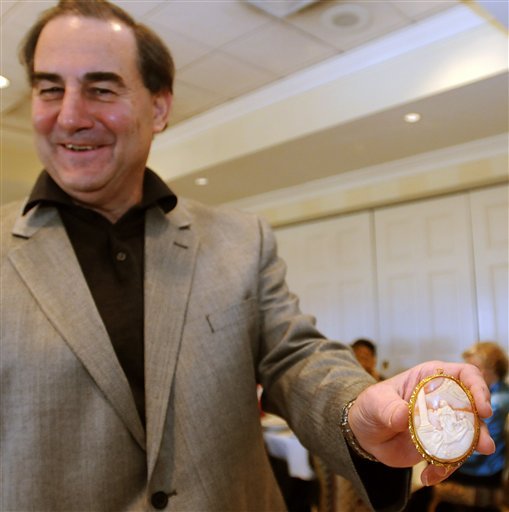Gratitude Series: Week 3
Gratitude Is a Choice
1 Peter 1:3-7
Introduction
An estimated 10,000 physicians have phony foreign medical degrees that brought one broker of fraudulent diplomas $1.5 million over three years, a congressional panel was told. Claude Pepper, Democrat-Florida, said many American citizens may be receiving medical treatment from doctors who lied on their medical school loan applications, and used the money not to go to school but to pay a broker for fake documents claiming they completed school and training.
Pedro DeMesones, who served a three-year prison sentence for mail fraud and conspiracy, told the panel that in three years of “expediting” medical degrees, he provided about 100 clients with false transcripts showing they had fulfilled medical requirements of schools they didn’t attend. “Clients paid me from $5225 to $27,000 for my services, ” DeMesones said. “In all I earned about $1.5 million in those three years. I only got to keep about $500,000 of this total. The rest went for bribes and expenses.”[1]
Wouldn’t you want to know that the doctor you go to is a real doctor and not one that bought a phony degree? Sure you would. Also, wouldn’t you want to know if your faith in Christ is genuine or fake? Peter takes us through this idea in 1 Peter 1:3-7
Prayer
_______________
The real test of thankfulness comes not when things are going great, but when the bottom falls out and things fall apart. The Bible says we should remain full of gratitude for what trials can produce within our lives. Like fire refines and purifies metal, so suffering and difficulty purify our lives as well.
I. Praising God Because of His Promise (vv. 3-5)
3 Blessed be the God and Father of our Lord Jesus Christ! According to his great mercy, he has caused us to be born again to a living hope through the resurrection of Jesus Christ from the dead, 4 to an inheritance that is imperishable, undefiled[2], and unfading[3], kept in heaven for you, 5 who by God’s power are being guarded through faith for a salvation ready to be revealed in the last time.
Peter began this section stating that God is to be blessed because he has caused us to be born again. Our praise and thanksgiving should be directed to God because it is he who gave his Son so that we may have hope.
“The word “blessed” here is eulogétos, a word applied to God alone in the New Testament. We derive the word eulogy from it. It means to praise or speak well of someone. We are to eulogize the God and Father of our Lord Jesus Christ. Our thoughts and hearts are to rise at every thought of Him.”[4]
The word “According” points to reasons we should be grounded in our salvation – it is because of his great Mercy is not getting what you deserve. How deep, how wide, how immense is God’s span of mercy?
We are born again to “a living hope” – our hope of eternal life is not rooted in superstition, wives’ tales, but in the historical fact of the resurrection of Jesus Christ who was dead (not a comma, or swooned, or passed out from blood loss). The hope mentioned here is not “Are you saved?” “I hope so,” No – our assurance of our salvation is a hope in the living Lord. It is a living hope.
Hope is an essential element in human life. “without it even the finest and best which earth can yield is shrouded with a deadly miasma of futility. Lacking a realizable future, our most meaningful experiences of – and our most profound confidences in – reality are but tantalizing projections of our fancy. Of what value is the education of man, the cultivation of his implanted capacities, the arousal of his noblest potentialities, if he at last is enveloped in the dark night of death and the unfeeling grave of extinction?”[5]
“God foresaw the fall of Adam and the subsequent ruin of the human race. He knew what He intended to do about that. When Father, Son, and Spirit decided that they would act in creation, they knew that the time would come when they would have to act in redemption. The plan of redemption also involved regeneration, giving us back in Christ what we had lost in Adam.”[6]
“The human spirit was to be indwelt by the Holy Spirit. Man would thus be enabled to cooperate with God in all aspects of his life. When sin entered into Adam, however, the Spirit of God departed from the human spirit, leaving Adam, and his race, permanently crippled.”[7] Regeneration happens when that spiritually crippled descendant of Adam receives Christ’s gift of salvation and the Holy Spirit comes into the believer’s soul and serves as proof of salvation in heaven.
Ephesians 1:13-14 “In him [Christ] you also, when you heard the word of truth, the gospel of your salvation, and believed in him, were sealed with the promised Holy Spirit, 14 who is the guarantee of our inheritance until we acquire possession of it, to the praise of his glory.”
You usually don’t receive an inheritance unless someone dies. Peter uses several analogies that direct our thinking to death – the word eulogy (blessed), being born again – indicating that we were spiritually dead, a living hope (pointing to Christ’s resurrection from the dead, and then the promise of an inheritance, which again, you don’t receive until someone dies.
Then Peter gives a description of what awaits believers when they die. He describes it as an inheritance.[8] In the Old Testament the inheritance is the land that God promised the people.[9] Abraham is promised an inheritance of the land of Canaan (Gen. 15:18; Acts 7:5; Heb. 11:8).
“In the Promised Land, every Israelite had his own possession, sat under his own fig tree, and enjoyed the fruit of his own vine (1 Kings 4:25).” But this Promised land was never safe and secure. “Marauders from the desert would invade the land and plunder the possessions of the inhabitants.”[10] There was constant fear of insects and drought.
The things we consider wonderful fade – we may have wealth today, but tomorrow the market could crash. We have popularity today but tomorrow the crowds seek to cancel us. We have power today, but tomorrow we are voted out of office, — everything this world has to offer fades, spoils, and decays.
The “Peter used a triple word picture to describe this inheritance. Our inheritance can never perish, spoil or fade. These verbal adjectives indicate that our inheritance is untouched by death, unstained by evil, and unimpaired by time. Our inheritance is death-proof, sin-proof, and time-proof. This inheritance is kept in heaven, for believers.”[11]
How do you explain eternal life, salvation, an inheritance in heaven? Peter has to describe them in negative words (perishing, spoiling, fading) because this is all we understand. “The glory of our heavenly inheritance is so far beyond human conception that the Scriptures must often resort to figures of speech instead of the literal terms or to weak comparisons with earth and thus to negatives, which tell us what will not be in heaven. The realities themselves transcend human language.”[12]
For the believer, the inheritance already exists and is waiting for them in heaven. No matter what difficulties we endure in this life, there awaits an eternal life in the life to come. We don’t have to worry about losing it – for it is God’s power that guards it and keeps it.
This inheritance is also described as a salvation. “Salvation can be defined as being rescued from God’s judgement or wrath on the last day (1 Pet. 4:17; cf. Rom 5:9; 1 Thess. 5:9).[13] Peter describes salvation as something that will be received in the future, it is a promised inheritance.
Salvation is discussed here in three different tenses. “As to the past, it cancels all of our sins, and because of Calvary, it cancels the penalty of sin as well. As to the present, by means of the indwelling Spirit of God, it deals with the power of sin. As to the future, we anticipate the return of Christ and an ultimate end to the very presence of sin.”[14]
The power of God mentioned here does not shield believers from trials, suffering, anguish, or persecution. “It means that God himself guards and watches over our salvation, our inheritance. Our relationship with God now as we grow more like Christ is a foretaste of that salvation which will be revealed when Christ returns.”[15]
Not only does God guard our inheritance in heaven, but he also guards us so that we do not lose our salvation. God does not operate in or upon our faith but above, over, and around us, upon our enemies. “It kept Daniel in the lion’s den, the three men in the fiery furnace, set bounds for Satan in afflicting Job, freed Peter from Herod’s prison, preserved Paul amid dangers, hardships, persecutions, etc. Great and wonderful is this protection of omnipotence, without which we should soon be overwhelmed.”[16]
In the Greek, this verb “shielded” or “guarded” (v. 5) is a military term that can mean either “to protect someone from danger” or “to prevent someone from escaping.” It is the same word used in Philippians 4:7 “And the peace of God, which surpasses all understanding, will guard your hearts and your minds in Christ Jesus.”[17]
“guarded through faith”[18]– When we speak of faith, Peter mentions both God’s protective power and human responsibility. Although, God has promised to protect us, we must employ our faith in our fight against the evil one. Ephesians 6:16 “In all circumstances take up the shield of faith, with which you can extinguish all the flaming darts of the evil one;”
“It is as faith which commits one to the keeping power of God. It is not man’s power but God’s power which, like the watchman of a city gate, guards the security of the one who is trusting in him.”[19]
II. Praising God Because of His Provision (v. 6-7)
6 In this you rejoice, though now for a little while, if necessary, you have been grieved by various trials, 7 so that the tested genuineness of your faith—more precious than gold that perishes though it is tested by fire—may be found to result in praise and glory and honor at the revelation of Jesus Christ.
In response to this wonderful inheritance of salvation that is being guarded by God himself, “In this you rejoice” Our response to life, with all its’ pain and suffering is to rejoice, to have gratitude in this life. Peter says that these trials “though now for a little while,” are for a purpose. But to remember that this life is but a speck in light of eternity.
He also explains that there is a purpose behind the various trials. The explains this purpose with the illustration of a goldsmith. “To form a useful object, raw gold must be melted, requiring a temperature of 1,900 degrees Fahrenheit. When the gold is melted, the impurities rise to the surface, where they are skimmed off or burned off.
A goldsmith knows the gold is ready to cast when the liquid gold becomes mirror-like and he can see his face reflected in the surface.”[20] Peter does not mention a refining, only a determining a genuineness.
The language of this illustration may also refer to the first-century process of making pottery. Potters baked clay pots to give them strength. The process sometimes cracked pots that had flaws, but the ones that survived the process were marked with the Greek word Peter used here (dokimos) for “genuine.”
“Sufferings function as the crucible for faith.”[21] Our tested faith by the trials of life will prove to be far more valuable than gold when Christ returns, “at the revelation of Jesus Christ.” Earlier, in verse 5 where it says, “to be revealed in the last time” is where we get the word apocalypse – “ready to be revealed” is a day when Christ is revealed in all his glory and power.
The sufferings and trials that we endure here and now are purifying and giving value to our faith, that will last for all of eternity. The faith we take with us, that has been found genuine, refined and purified will be with us forever.
We are to value the trials because they reveal our flaws and impurities. They are an opportunity to change. But Peter explains, “What God now finds is what pertains to the reward of grace which he will bestow upon us at the last day.”[22] While I am here, I can change and become more like Christ, and God is working to make me more like Christ (through trials).

When it was time for me to get an engagement ring for Kimberly, I drove and hour and half to a business building where I was buzzed in to meet with Tom Neville in Montgomery, Alabama. Tom is a retired NFL football player and opened his jewelry business in 1983.
He met with just me, and walked me through the different kinds of diamonds, colors, how they were classified and got out trays of diamonds for me to look at and for me to pick the right one. Even later after she said yes, he mailed me three diamond wraps for Kimberly’s wedding ring. But one of the things that stuck was that there are no natural flawless diamonds – every natural diamond is flawed, it just to what degree; can you see it with normal eyes, or does it require a microscope?
A diamond after years of tremendous pressure is fixed. It is then shaped to the shape the jeweler desires. It can’t change, continued pressure does nothing to it. Gold can be purified, and purified, and purified. Gold and diamonds have impurities, but only one can change that.
_____________________
[1] Spokesman Review, December 8, 1984
[2] “The Greek word amiantos, which means undefiled, refers to a mineral found among the rocks and made into a fire-resisting fabric. Though soiled, it turned pure white when placed in the fire. Romans paid generously for it; in it they wrapped the remains of their dead, so that in cremation the precious ashes would be preserved in a fabric unaffected by the consuming fire. The Christian’s inheritance is free from the taint of defilement; it is unaffected by the fiery judgement.” George Arthur Buttrick, Gen. Ed. The Interpreter’s Bible, Volume 12 (Nashville, Tennessee; Abingdon Press, 1957) 94.
[3] “The Greek modifiers (imperishable, undefiled, unfading) all begin with the letter “a” imparting the kind of alliteration frequently used in sermons: aphtharton, amianton, amaranton.” Clifton Allen, The Broadman Bible Commentary, Volume 12 (Nashville, Tennessee; Broadman Publishing, 1972) 151.
[4] John Phillips, Exploring The Epistles of Peter (Grand Rapids Michigan; Kregel Publishing, 2005) 36.
[5] Buttrick, 92.
[6] Phillips, 38.
[7] Ibid, 39.
[8] “Peter uses an astonishing variety of expressions for the coming salvation of the end-time. (for example, “a living hope” [1:3], God’s “wonderful light” [2:9], “the gracious gift of life” [3:7], “inherit a blessing” [3:9], “crown of glory” [5:4], and “eternal glory” [5:10]. (Kistemaker, 44)
[9] Num 32:19; Deut. 2:12; 12:9; 25:19; 26:1; Josh 11:23; Ps 105:11; Acts 7:5
[10] Simon J. Kistmaker, New Testament Commentary, Peter and Jude (Grand Rapids, Michigan; Baker Book House, 1987) 43.
[11] Max Anders, Gen. Ed., Holman New Testament Commentary, 1&2 Peter, 1,2,3, John, Jude (Nashville, Tennessee; Holman Reference, 1999) 8.
[12] R.C. Lenski, The Interpretation of 1 and 2 Epistles of Peter, the three Epistles of John, and the Epistle of Jude (Minneapolis, Minnesota, 1966) 34.
[13] Thomas R. Schreiner, The New American Commentary, 1, 2 Peter, Jude (Nashville, Tennessee; Broadman & Holman Publishing, 2003) 63.
[14] Phillips, 47.
[15] Anders, 8.
[16] Lenski, 36.
[17] Kistemaker, 44.
[18] Revelation chapters 2-3 seem to indicate that there are angels for each church? Are there angels that stand guard for churches today?
[19] Allen, 151.
[20] Ibid, 9.
[21] Thomas R. Schreiner, The New American Commentary, 1,2 Peter, Jude (Nashville, Tennessee; Broadman & Holman Publishers, 2003) 67.
[22] Lenski, 40.


 Some years ago, I decided that I wanted to run a marathon, and having ran several half-marathons I set out on a training schedule. Usually, you run increasing miles over several months to where you have a “long run” – and for me, the long runs were on Friday morning, where I would run until lunch time. If you missed a week of training, the miles would jump up instead of by two to four mile differences. Your body would go into shock if you set out to run 26.2 miles with no training, no preparation – but if you slowly add mile after mile, week after week your body adjusts – you build endurance.
Some years ago, I decided that I wanted to run a marathon, and having ran several half-marathons I set out on a training schedule. Usually, you run increasing miles over several months to where you have a “long run” – and for me, the long runs were on Friday morning, where I would run until lunch time. If you missed a week of training, the miles would jump up instead of by two to four mile differences. Your body would go into shock if you set out to run 26.2 miles with no training, no preparation – but if you slowly add mile after mile, week after week your body adjusts – you build endurance.
